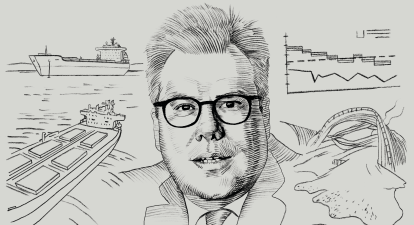As part of the project for Independence Day «Ukraine to the World», Forbes asked Sebastian Galiani, Mancur Olson professor of economics from the University of Maryland, to analyze the main economic consequences of the war in Ukraine for the world. The professor believes that the war affected every country and created three long-term trends for the world economy
Купуйте річну передплату на шість журналів Forbes Ukraine за 1259 грн замість 1799 грн. Якщо ви цінуєте якість, глибину та силу реального досвіду, ця передплата саме для вас. В період акції Christmas sale діє знижка 30% 🎁
The war in Ukraine is not just a regional crisis. It has far-reaching implications that are reverberating across different regions of the world. The conflict has dealt a major blow to the global economy, leading to slower growth and faster inflation.
As we analyze the multifaceted consequences of this war, three main channels emerge through which the effects are being felt worldwide.
1. Soaring commodity prices and inflation pressures.
Russia and Ukraine, both major commodities producers, have experienced significant disruptions due to the conflict. Global prices for commodities like oil, natural gas, and wheat have surged. With wheat alone accounting for 30% of global exports from these two countries, food costs have reached record highs.
These price increases have far-reaching impacts. Inflation is surging, eroding the value of incomes and putting pressure on demand. Countries reliant on oil imports are facing wider fiscal and trade deficits, while some exporters in the Middle East and Africa are benefiting from higher prices.
2. Disrupted trade and supply chains in neighboring economies.
Neighboring economies are grappling with disrupted trade, supply chains, and remittances, exacerbated by an unprecedented surge in refugee flows. Eastern Europe, in particular, is facing rising financing costs and an influx of over 3 million refugees fleeing Ukraine, as per United Nations data.
Countries with direct trade, tourism, and financial exposures to the region are also feeling additional pressures. European economies, heavily reliant on Russian natural gas imports, are experiencing fueling inflation and slower economic recovery from the pandemic. Governments may face fiscal pressures as they invest in energy security and defense budgets.
3. Reduced business confidence and higher investor uncertainty.
The geopolitical tension triggered by the war has led to reduced business confidence and higher investor uncertainty worldwide. Asset prices were under pressure, leading to tighter financial conditions.
Geopolitical and Long-term Implications
Looking beyond immediate impacts, the war in Ukraine may fundamentally alter the global economic and geopolitical order. The shifting energy trade, reconfigured supply chains, fragmented payment networks, and countries reevaluating reserve currency holdings are some long-term consequences.
Geopolitical tensions raise the risks of economic fragmentation, particularly in trade and technology. Europe and neighboring regions will be at the epicenter of these changes, as Russiaʼs recession and unprecedented sanctions reshape the financial landscape.
Regional Impacts
1. Europe. The region is already facing an immense toll from the conflict, and energy remains the main spillover channel. Wider supply-chain disruptions could be consequential, and fiscal pressures may arise from additional spending on energy security and defense.
2. Caucasus and Central Asia. These neighboring nations face severe consequences from Russiaʼs recession and sanctions, impacting economic growth, inflation, and external and fiscal accounts.
3. Middle East and North Africa. Rising food and energy prices and tighter global financial conditions will have substantial ripple effects on economies, potentially leading to capital outflows and social tensions in some countries.
4. Sub-Saharan Africa. Progress made in recovering from the pandemic may be threatened, as the region grapples with higher energy and food prices and reduced tourism. Socio-economic pressures and public debt vulnerability may intensify.
5. Western Hemisphere. Latin America and the Caribbean are particularly vulnerable to spillovers from food and energy prices, with central banks facing the challenge of defending inflation-fighting credibility.
6. Asia and the Pacific. Limited direct economic ties to Russia mitigate spillovers, but slower growth in Europe and the global economy takes a toll on major exporters. Petroleum importers in the ASEAN economies, India, and frontier economies may see significant impacts.
In the dry residue
The war in Ukraine has unleashed far-reaching effects on the global economy and geopolitical landscape. From soaring commodity prices to disrupted trade and supply chains, and reduced business confidence, the consequences are significant and challenging.
Policymakers worldwide face the difficult task of containing inflation and supporting economic recovery amidst the crisis. The need for a global safety net and regional arrangements to buffer economies from shocks becomes ever more critical as we navigate this shock-prone world. The war in Ukraine underscores the importance of international cooperation and collective strength in dealing with the challenges that lie ahead.


Вы нашли ошибку или неточность?
Оставьте отзыв для редакции. Мы учтем ваши замечания как можно скорее.













